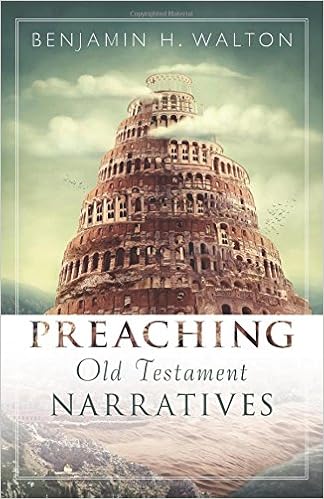
Preaching
Old Testament Narratives by Benjamin Walton
How does a minister faithfully preach God’s Word from
the Hebrew Bible or Old Testament? How
must he be faithful to the original intent of the text but bring it to today’s
audience? These questions are answered
in Dr.Benjamin Walton’s new book, Preaching Old Testament Narratives. Walton, president of PreachingWorks, a
company designed to help pastors faithfully and consistently preach God’s Word,
delivers the goods in this book by carefully bringing us along in his
journey.
One of the aspects of this book that is very valuable is
Benjamin’s insistence that we preach CUT’s or Complete Units of Thought,
identify historical and theological contexts, and finally at the end craft the
take home truth (steps 3-4 include studying the plot and the original
theological message). Why is it
important first to preach complete unit of thoughts? For one, “a poorly chose preaching text can
doom the sermon before it begins. In
general, we need to preach an entire CUT, because OT narratives teach few theological
principles and because it takes an entire CUT to convey an OTM (original theological
message). Thus, preaching partial CUTs
typically results in misapplication.” (47)
Preachers misapply God’s Word because they combine too many units of
thought and thematic concerns that often are very different from each other or
carry with them disparate themes.
Further, preaching complete units of thought give the preacher a focused
narrative section that brings to surface the primary message of the text,
rather than secondary or tertiary concerns.
The section in chapter 7 was most helpful for my
preaching because I often wonder if I bore my listeners if I re-read the whole
text too many times. Walton gives us
wisdom here by writing, “When we summarize-without-reading, it’s often best to
keep it under fifty words…All we need to do is capture the gist of the verses.”
(140) The succinctness of the reading is
helpful because it helps give our listeners a good idea of what’s going on in
the text without being bogged down by the details. Further, one advantage of the
summarize-without- reading is that we
are able to put the biblical text in an modern idiom that conveys the meaning
in a listener friendly way, often getting into the character’s minds.
Overall, this was a very helpful book and aid to the
preaching of Old Testament narratives.
Thanks to Kregel Ministry for the copy of this book in
exchange for an honest review.
Comments
Post a Comment